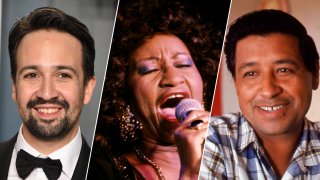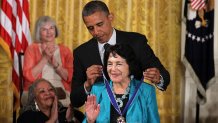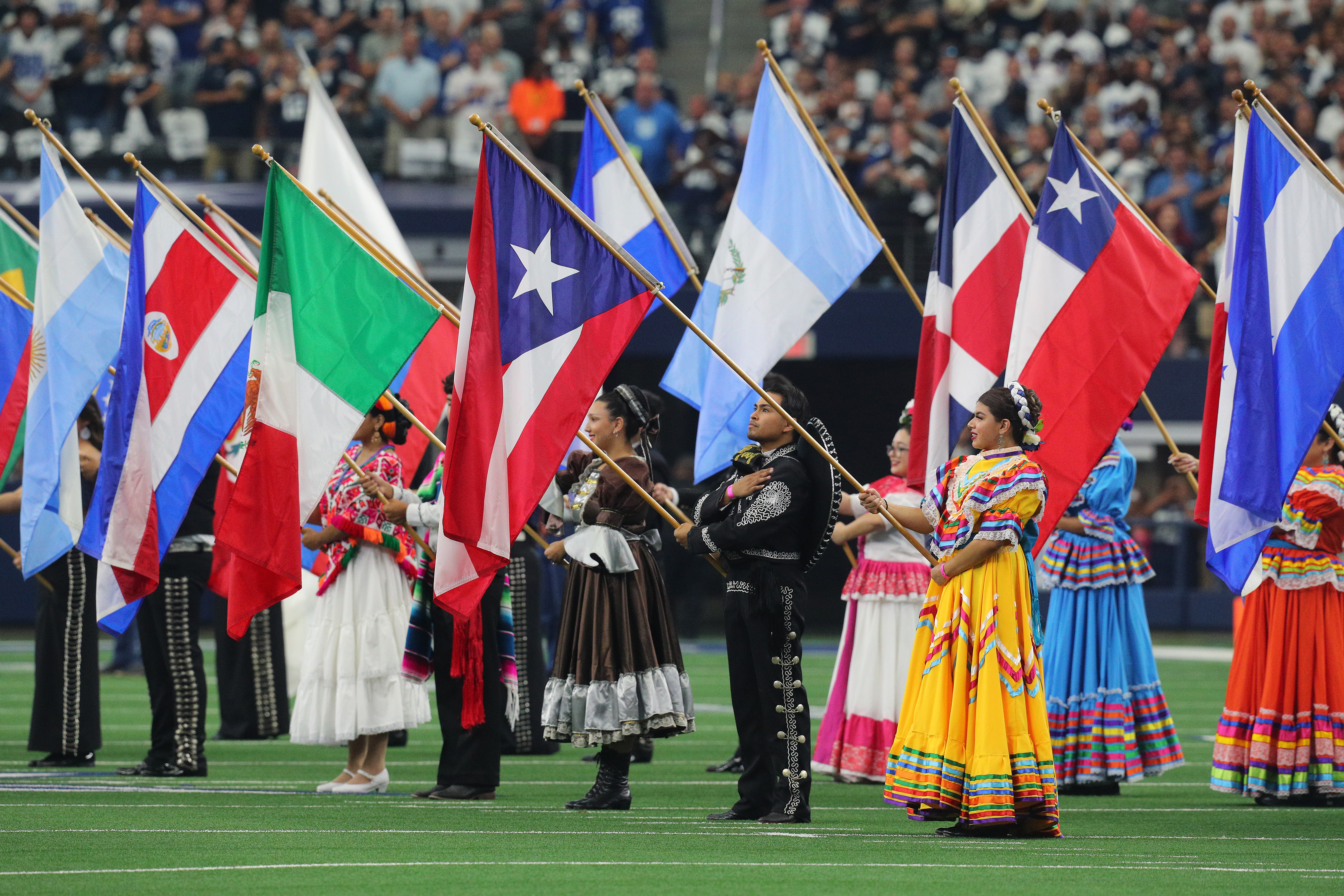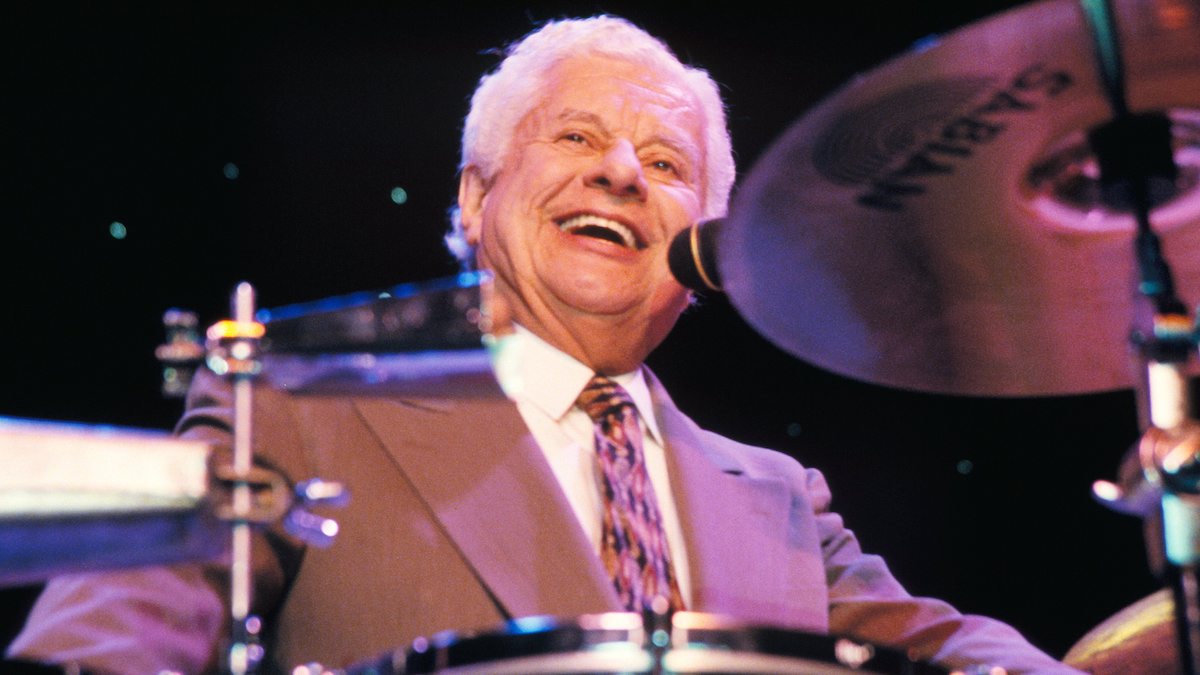
They are activists who worked for the rights of migrant workers, law makers and politicians as well as fashion designers and innovators.
Hispanic Latinos are the fastest growing population in the United States accounting for roughly 18% — 60.6 million — of the nation's total population. Latinos continue to contribute to American culture as musicians, small business owners, chefs, veterans and many other professions.
The sounds of Latin music have permeated U.S. airwaves and influenced American artists. Celia Cruz brought salsa to the masses and thanks to artists like Ricky Martin, Maluma and Shakira, Latin music is wildly listened to by an English-speaking audience.
Hispanic Heritage Month, which runs from Sept. 15 to Oct. 15, honors the contributions that Hispanic and Latino Americans have made to U.S. society and the fabric of its culture.
Get top local stories in San Diego delivered to you every morning. >Sign up for NBC San Diego's News Headlines newsletter.
Here are just a few of the trailblazers who have made a difference and those who continues to do so:
Lin-Manuel Miranda: Playwright/ Composer
A native New Yorker, Lin-Manuel Miranda is a composer, songwriter and actor. He is the creator of "Hamilton," a musical about the country’s first secretary of treasury who founded a national bank. "Hamilton" was used not only to educate and entertain; it also changed the idea of historical adaptation because Hamilton’s story is told through song-and-rap lyrics.
Before his success with "Hamilton", Miranda composed "In the Heights," a Tony-winning musical about the predominantly Hispanic neighborhood of Washington Heights in upper Manhattan. The film adaption of the musical was released in 2020.
Following the success of "Hamilton," Miranda released the "Hamilton Mixtapes," remixes and covers of the soundtrack featuring guests like Chance the Rapper, Wiz Khalifa and even President Barack Obama. The most notable of those features being "Immigrants (We Get the Job Done)", a song about the role immigrants play in country.
In the aftermath of Hurricane Maria in 2017, Miranda used his talents to compose a benefit single, “Almost Like Praying,” to support relief efforts in Puerto Rico, where his father is from.
Miranda is a three-time Tony Award winner, a Grammy winner and the recipient of the 2016 Pulitzer Prize winner in Drama.
Sonia Sotomayor: Supreme Court Justice

Justice Sonya Sotomayor was appointed to the federal bench in 2009 by President Barack Obama. She is the first Latina on the bench and the fourth woman to serve on highest court in the U.S.
Sotomayor has been a part of two major historic rulings. She was among the six justices to uphold the Affordable Care Act in King vs. Burwell in 2015. The decision allowed the federal government to continue to provide subsidies to those who purchase health care whether state or federally funded.
She also sided with the majority in Obergefell vs Hodges in 2015, a decision that made same sex marriage legal in all 50 states.
Sotomayor's origin story is relatable to hundreds of young Americans. After her father died at an early age, she was raised by a single mother in the housing projects of the Bronx and through hard work she earned degrees from both Princeton University and Yale Law School.
Sylvia Rivera: American Activist

Sylvia Rivera was a transgender sex worker-turned-activist in the 1960s and 70s. She became an activist after patrons of the Stonewall Inn violently rebuffed a police raid in 1969. She campaigned with the Gay Activist Alliance (GAA) in New York City to enact a nondiscrimination ordinance.
In 1970 she organized a sit-in protest at the Weinstein Hall at New York University after the administration cancelled planned dances on the anniversary of the Stonewall riots. The sit-in lasted five days before the protesters were forcibly removed by police.
As a Latina trans activist Rivera did not feel like she fit in with the mostly gay, male and white members of the GAA (at the time). She left the group and refocused her attention to working with homeless teenagers, co-founding the Street Transvestite Action Revolutionaries (STAR) with Marsha P. Johnson in the 1970s.
STAR provided shelter and a social space for trans sex workers and other LGBTQ youth. STAR House was the first shelter for the LGBTQ community in the U.S. and the first to be organized by women of color.
Rivera died in 2002. In 2019, Marsha P. Johnson and Rivera were among the 50 Americans inducted into the National LGBTA Wall of Honor at the New York City Stonewall Inn memorial.
Rita Moreno: Actress

The Puerto Rican actress is best known for her role as "Anita" in the film adaptation of "West Side Story." Moreno won an Academy Award for Best Supporting Actress in 1962, the first Latina recipient of the honor.
After winning an Oscar, Moreno hoped for more variety in acting roles but found she was typecast for "exotic" roles. Moreno left Hollywood and mostly acted in theater until the 1970's when she appeared in "The Night of the Following Day," "Carnal Knowledge," and "Marlowe.
Over her decades-long career, Moreno also earned Emmy, Tony and Grammy awards, making her just one of only 11 people to receive the coveted EGOT. She broke another barrier in 2019 when she became the first Latino honored with a Peabody Award.
Her list of accolades also includes the Presidential Medal of Freedom and a Screen Actors Guild Lifetime Achievement Award.
Moreno was also the executive produce and star in Steven Spielberg’s remake of "West Side Story," which was released in 2021.
Dolores Huerta: Labor Leader, Civil Rights Activist, Organizer

Co-founder of the United Farm Workers Association, Dolores Huerta has spent most of her life fighting for better working conditions for farmworkers and the rights of the downtrodden.
Born in Dawson, New Mexico, Huerta's father was a farm worker and miner who ran for political office and won a seat in the New Mexico legislature in 1938.
After her parents divorced, her mother moved to Stockton, California, where a teenage Huerta, outraged by the racial and economic injustices she saw in California's agricultural Central Valley, later found her calling as an organizer while serving in the leadership of the Stockton Community Service Organization, according to her foundation.
She led voter registration drives and pressed local governments for barrio improvements. She also co-founded the Agricultural Workers Association, the predecessor of the United Farm Workers’ Union, with Cesar Chavez.
Huerta has worked to elect several candidates including President Bill Clinton and California Gov. Jerry Brown. She's also credited with coining the slogan "Sí se puede" — Spanish for "Yes, we can" — the mantra of former President Barak Obama's 2008 presidential campaign. Obama acknowledged Huerta as the source of the phrase when he awarded her the Presidential Medal of Freedom in 2012
Her foundation, the Dolores Huerta Foundation, advocates for women, children and those living in impoverished communities. She continues to teach immigrants about the laws or agencies that can protect them as well as benefits that they are entitled to. She travels the country in support of equality and civil rights.
Celia Cruz: Singer

According to Billboard magazine, Celia Cruz was "indisputably the best known and most influential figure in the history of Cuban and Latin music."
"The Queen of Salsa" was a dynamic performer in every sense. With her powerful voice and flamboyant stage shows, Cruz helped bring salsa music to a broad audience.
In the 1950s, Cruz became famous with the legendary Afro-Cuban group La Sonora Matancera. She left Cuba after the 1959 revolution and often said she would love to return — when Castro no longer was in power. In the end, Castro outlived Cruz, according to The Associated Press. She died from a brain tumor in 2003.
Cruz recorded more than 70 albums over six decades and had more than a dozen Grammy nominations. She won best salsa album for "La Negra Tiene Tumbao" at last year's Latin Grammy Awards, and won the same award at this year's Grammy Awards. Among her other best-known recordings are "Yerberito Moreno" and "Que le Den Candela."
Her musical partnership with fellow salsa star and "Mambo King" Tito Puente, garnered some the biggest successes in her career.
In 1987, she was honored with a star on Hollywood's Walk of Fame, and several years later, the city of Miami gave Calle Ocho, the main street of its Cuban community, the honorary name of Celia Cruz Way.
Cruz also received a Lifetime Achievement Award from the Smithsonian Institution and in 1994, U.S. President Bill Clinton honored her with an award from the National Endowment for the Arts.
Cesar Chavez: American Activist

Chavez is one of the most recognized Latino activists in the country. He used a non-violent approach to bring attention to the plight of farmworkers. He co-founded the National Farm Workers Association in 1962, which later became United Farm Workers.
As a child, Chavez and his family were migrant farmworkers who worked long hours under the sun. Chavez led marches, boycotts and went on several hunger strikes to demand fair wages and humane working conditions. He served as a union leader and dedicated his life to protecting and improving the lives of farm workers.
Most notably, Chavez was one of the organizers for a national boycott of California's grapes due to the unlivable wages and poor working conditions that farm workers were forced to endure. In 1970, after five years of the grape strike, farm workers won a the first union contract promising better pay and benefits.
A few years after the strike, California lawmakers passed the California Agricultural Labor Relations Act, which promised collective bargaining power for farmworkers across the state.
Chavez died in 1993. In 2014, Obama announced March 31, Cesar Chavez's birthday, would be recognized as a federal commemorative holiday.
Chavez was known to protest by fasting. In 1988, he went on a 36-day water-only fast to protest the use of agricultural pesticides, breaking it on Aug. 22 with a piece of bread from Ethel Kennedy, the widow of Robert F. Kennedy, the Los Angeles Times reported at the time. Rev. Jesse Jackson took up where Chavez left off, fasting on water for three days before passing on the fast to celebrities and other prominent leaders.
"During the past few years I have been studying the plague of pesticides on our land and our food," Chavez said. "The evil is far greater than even I had thought it to be, it threatens to choke out the life of our people and also the life system that supports us all. This solution to this deadly crisis will not be found in the arrogance of the powerful, but in solidarity with the weak and helpless. I pray to God that this fast will be a preparation for a multitude of simple deeds for justice."
Gloria Estefan and the Miami Sound Machine: Musicians

Formed in 1975 by the Cuban-born musician Emilio Estefan Jr., the group was originally called The Miami Latin Boys before changing it to the Miami Sound Machine in 1977 after another Cuban immigrant, Gloria Fajardo, joined the group as vocalist. Estefan and Fajardo married in 1978.
In 1985, the Miami Sound Machine exploded onto the popular music scene with the Latin crossover hit "Conga," introducing for the first time the sounds of the Afro-Cuban drumbeat to an English-speaking audience.
"It's arroz con frijoles (black beans and rice) and hamburgers," said the band's drummer, Enrique Garcia, who co-wrote "Conga."
"Conga" reached No. 10 on the Billboard Hot 100 and the album, "Primitive Love," launched two more top 10 hits with "Bad Boy" and "Words Get In the Way." While the band had several dance hits, it was Estafan's ballads that engendered its success. One by one, the hits piled up. The Estefans began producing other Cuban-American acts and served as the godparents of a new genre of music.
Gloria Estefan has had one of the most enduring careers in the music industry. She broke barriers by successfully producing albums in both Spanish and English. Estefan has won several Grammy and Latin Grammy Awards, she is the recipient of the American Music Award for Lifetime Achievement and the 1993 National Music Foundation's Humanitarian of the Year award, among other accolades.
Meanwhile, Emilio Estefan built a Latin music empire, producing albums for Latin music's biggest artists including Marc Anthony, Jennifer Lopez and Shakira, and garnering 18 Grammy awards along the way.
In 2015, Obama presented the couple with the Presidential Medal of Freedom for their trailblazing contributions to music and Latin American culture. Two years later, Gloria Estefan was named a recipient of the prestigious Kennedy Center Honors. The two also won the 2019 Library of Congress Gershwin Prize for Popular Song. They’re the first married couple or musicians of Hispanic descent to win the prize.
"We came with a lot of dreams, no money, we were fighting for our dreams," Emilio Estefan said in a PBS special celebrating their careers. "It makes us proud to live in a country that you can still have the American dream.”




